How To Use Apple Cider Vinegar for Healthy Chickens
One of my favorite things to use on our homestead is raw organic apple cider vinegar for healthy chickens. It is easy to find and purchase, simple to make, and has so many uses that I highly recommend adding it to your raising chickens routine.
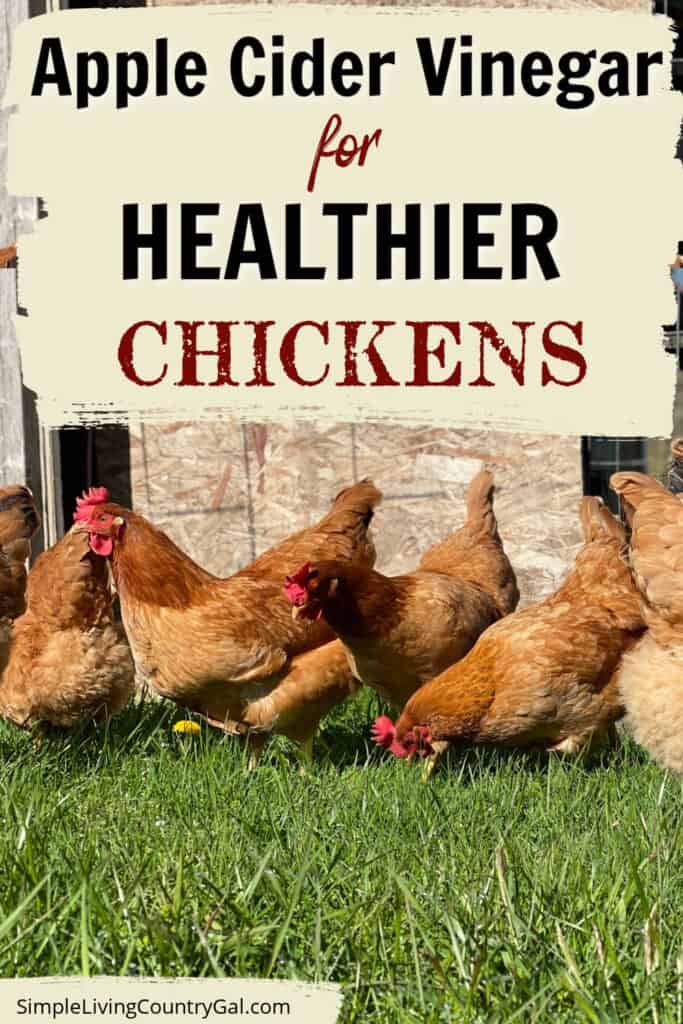
Although ACV (apple cider vinegar) works wonders with many animals, this post will focus only on chickens.
I love to treat my animals as naturally as possible. Promoting a healthy environment in both my birds and their surroundings is so much more beneficial than waiting for sickness to hit.
Building up immune systems in all my animals is something I focus on daily and is the number one reason my livestock is healthy and strong today.
This is especially important if you are free-ranging your birds. A healthy immune system can prevent them from picking up nasty diseases while out foraging on their own.
Disclaimer: In accordance with FDA guidelines, the information and products offered on this website are not intended to diagnose, treat, cure, or prevent any disease. These tips are from experience and learned from other chicken owners, none of these results have been substantiated by scientific studies.
Most of my tips below call for 1 tablespoon of ACV to 1 gallon of water. It is best to do your mixture as needed rather than mix a big batch all at once.
It is important to note that using ACV with a metal waterer is a big no-no because of the acidity. The apple cider vinegar can corrode metal and possibly contaminate the water, which can harm your chickens.
Always use a rubber or plastic waterer when using ACV in your flock. Although the plastic waterers are nice, I prefer the rubber water bowls that I use for many of my animals. They are simple to move, easy to clean and sterilize, and very durable even in the winter.
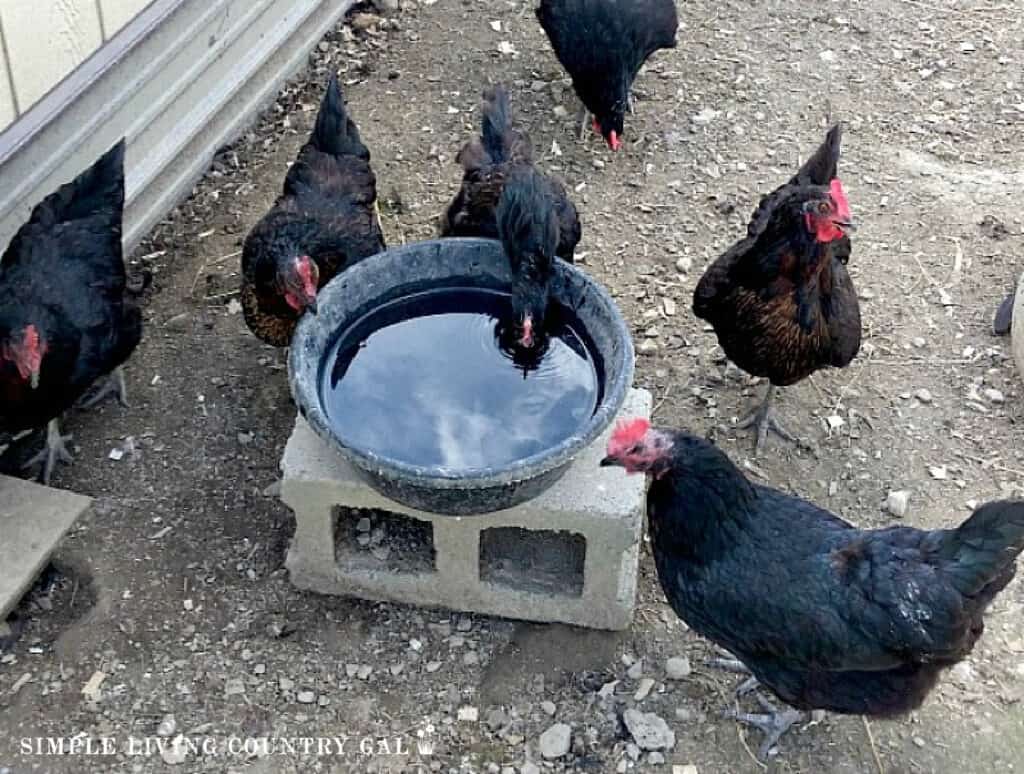
SLCG PRO TIP: Keep water bowls up off the ground to keep your hens from soiling the water. I keep mine on cinder blocks in my coop and outside in the run. Chickens love to scratch the ground with their feet. If they do this near to the water bowl, soil and other debris can go into the water, soiling it.
It is important to use only organic apple cider vinegar with the “mother”. You can read about my favorite ACV below and the benefits of that specific brand. You can also make your own which I will show you how to do later.
Remember, when you first offer ACV to your flock, be sure to have plain water nearby as well for them to drink.
Forcing your hens to drink ACV water may cause them to avoid drinking at all, especially if they do not like the taste right off. By having plain water nearby, you will allow them to adapt at their own pace.
How To Use Apple Cider Vinegar For Healthy Chickens
Let’s go over a few ways to use ACV with your coop and flock.
#1 Keeps a body in balance.
In every healthy animal, you will find a balance of chemicals, vitamins, and minerals. ACV, although acidic, actually has an alkalizing effect.
Our goal is to keep our chickens from becoming too acidic, which will leave them open to many diseases. By adding ACV to your hen’s water, you will keep your chicken’s health in balance by regulating the body’s PH

#2 Promote water consumption.
Most, if not all, chickens love the taste of apple cider vinegar, which encourages drinking. It also keeps the water cleaner and clear of bacteria. This does not mean you can keep their water unchanged for longer periods of time.
The number one way to have a healthy flock of chickens is to ensure they are hydrated and drinking consistently. This means you will want to change out their water daily and wash out the bowls weekly.
The cleaner the water, the more your chickens will drink it.
#3 Better eggs
Apple cider vinegar has been shown to boost calcium absorption from the feed and treats that you give to your chickens. This will help improve the quality of your hen’s eggs and give them stronger shells. Stronger shells mean better eggs.
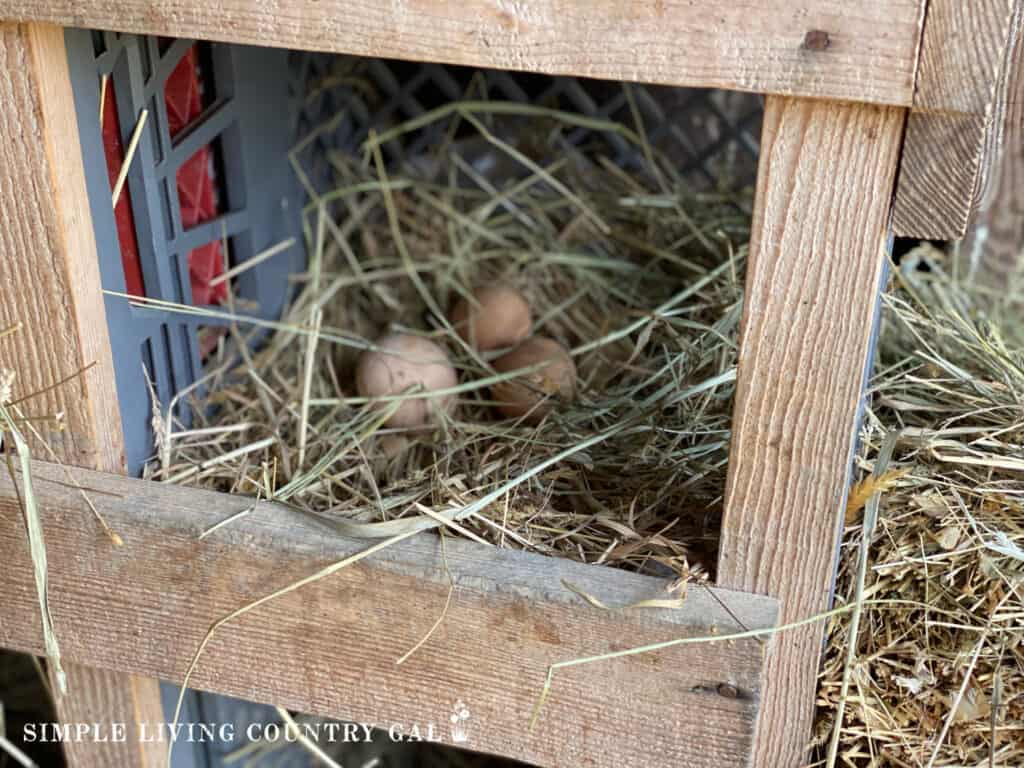
#4 Cleaner bums
ACV also helps with pasty bums. Just a couple of drops added to a quart waterer can be given to your chicks. ACV helps to keep bowels regulated and should prevent pasty bum issues, which can quickly kill baby chicks if not treated.
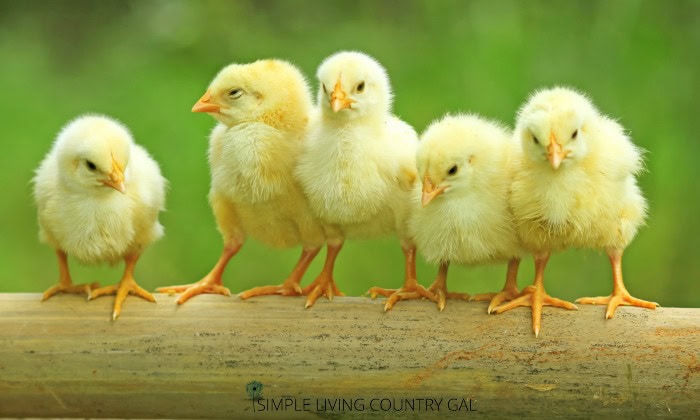
What is Pasty Butt in Chickens?
Pasty Butt or Pasty Vent is when feces sticks to the downy feathers around a chick’s vent. If not removed, it can form a blockage and be fatal to your chicks.
To remove debris found on a chick’s feathers, use a Q-tip dipped in warm water and gently clean away the crusted dirt. It is best to do this daily or more often if needed.
#5 Treating Cocci in chicks and hens
Coccidiosis is an intestinal disease that is animal-specific. That means chicken Coccidia cannot be spread to goats and vice versa. The disease is more common in young chicks but can also be found in older hens.
It is passed through chicken droppings and, if not caught and treated, can spread quickly and destroy a flock.
ACV is a form of probiotic that can boost an animal’s immune system. Although ACV is not a direct preventative of Cocci, it does promote strong immune systems that are more resistant to the effects of Cocci.
Giving your hens probiotics can help to maintain a normal and healthy level of culture and good bacteria in the bowels. This will help to prevent the more harmful (but natural) occurring cocci bacteria from proliferating to the point where it causes scours (diarrhea) and dehydration.
I like to add 1 tablespoon ACV to 1 gallon of water and give it to my chickens at least once a week. This encourages healthy bowels and, so far, has kept Coccidia from affecting my flock.
You can add ACV more often, but I have found weekly works best for my hens.
#6 Friendly roosters
Another tip I have read about but have not tried is to put a little ACV in a water bottle to help settle aggressive roosters. The water bottle is used to spray as a deterrent for the roosters. This method is supposed to keep the rooster from attacking owners and has worked quite well for some.
I am not sure if it is the ACV that does the trick or the spray bottle itself, but after using this method a few times, I read that the roosters learn that the bottle means to stay away. I would use this tip with caution, however. ACV in the eyes can sting and burn, so spraying any animal this way can do more harm than good. I suggest trying just plain water at first to see if that does the trick.
#7 A better cleaner
I mentioned before that ACV is quite effective in preventing pests. This means that it is a great ingredient to use for an effective spray cleaner. Add about 1/4 of a cup ACV to 1 gallon of water. Add a few drops of hydrogen peroxide. Mix and pour into a spray bottle as needed.
The vinegar spray will deter pests and keep them from infesting your flock. A super simple step that has so many benefits. You can also use white vinegar to clean as well which may be a more affordable option when just starting out.
Please remember that whenever you add anything new to any of your animal’s feeding regimes, you must do so slowly. This will help your animals adjust more easily and keep their digestive systems regulated.
You can keep a second water source nearby that does not contain ACV. This will allow your chickens to choose the one they prefer. Don’t worry if your hens ignore the ACV option at first; they will eventually try it.
My favorite brand of ACV is Braggs. It can be found now in most stores and online.
Ingredients of Braggs ACV:
Certified Bragg Organic Raw Apple Cider Vinegar is unfiltered, unheated, unpasteurized, and 5% acidic. Contains the amazing Mother of Vinegar, which occurs naturally as strand-like enzymes of connected protein molecules.
Information of Braggs ACV:
Bragg Organic Raw Apple Cider Vinegar is made from delicious, healthy, organically grown apples. Processed and bottled in accordance with USDA guidelines, it is Certified Organic by Organic Certifiers and Oregon Tilth; and is Kosher Certified. Bragg Organic Raw Apple Cider Vinegar is full of zesty Apple Cider Vinegarnatural goodness. Its a wholesome way to add delicious flavor to salads, veggies, most foods, and even sprinkle over popcorn.
Apple Cider Vinegar has been highly regarded throughout history. In 400 B.C. the great Hippocrates, Father of Medicine, used it for its amazing health qualities.
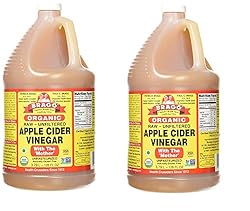
How to make your own ACV
- It is also pretty easy to make once you’ve got a mother started. Start out with purchased ACV and raw apple juice.
- Mix one cup or so of Braggs (or another brand ACV) with the apple juice in a large mason jar or another glass container.
- Place a coffee filter on top and secure it with a rubber band.
- Store in a dark place for a few months.
As it ages, a cloudy, gelatinous mass will form on the top. That is the mother and what makes acetic acid. You can use this mother to start more ACV, give it away to others, or cut the excess up and feed your chickens.
The hens love it, and it is full of wonderful goodness.
SLCG PRO TIP: If you cannot find unpasteurized apple juice, you can take just about any kind of juice, frozen or bottled, and get it to ferment if left somewhere warm for long enough. Making your own truly ensures you do have a mother, which to some, is an important step they would rather do/see for themselves.
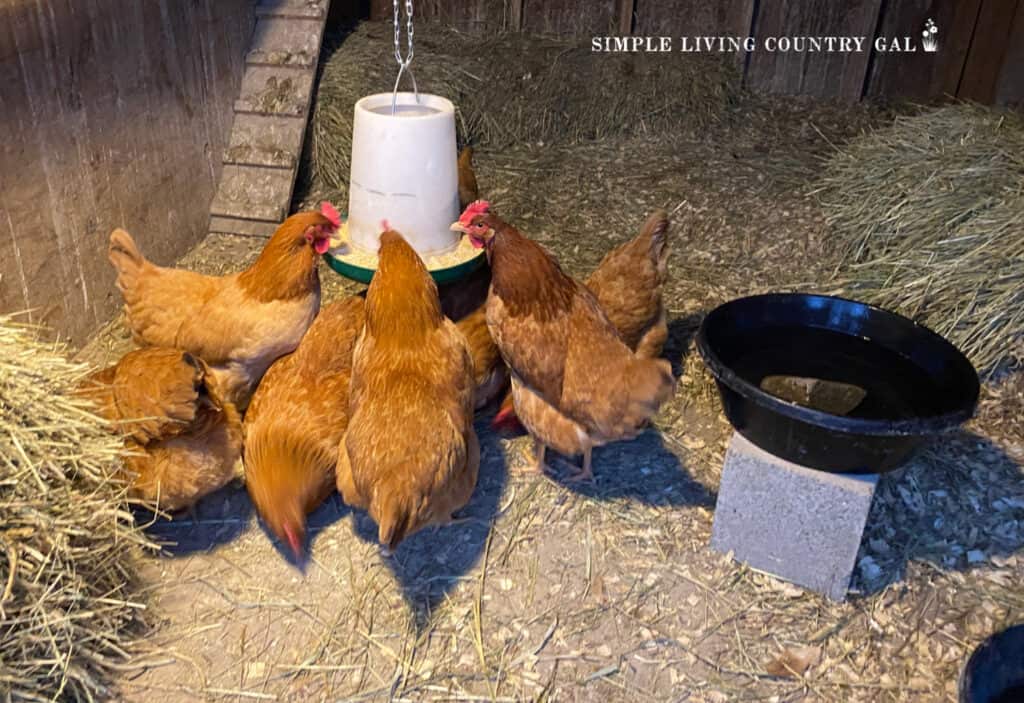
There is nothing I love more than promoting the health of all of my animals. So many people wait until there is an issue before giving aid. By keeping the coop clean, fresh water out at all times, and good quality feed, you will be well on your way to healthy animals.
Why not take it one step further and build up their immune systems naturally so they are better equipped to fight pests and diseases on their own?
As they say, an ounce of prevention is worth a pound of cure!

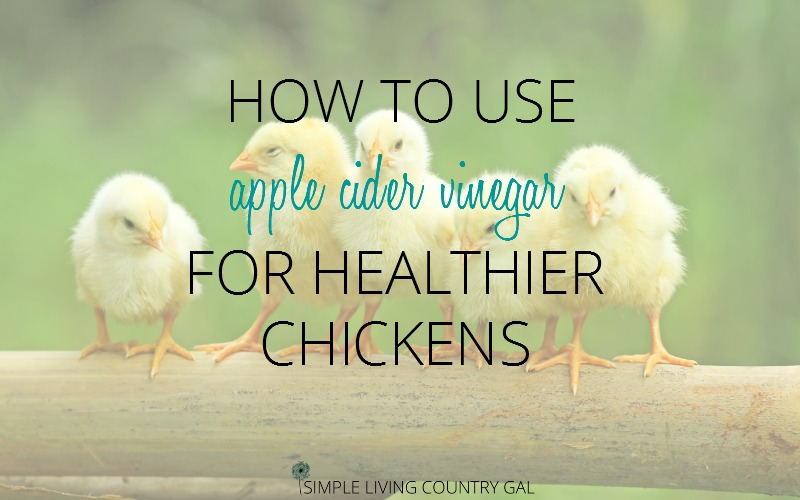
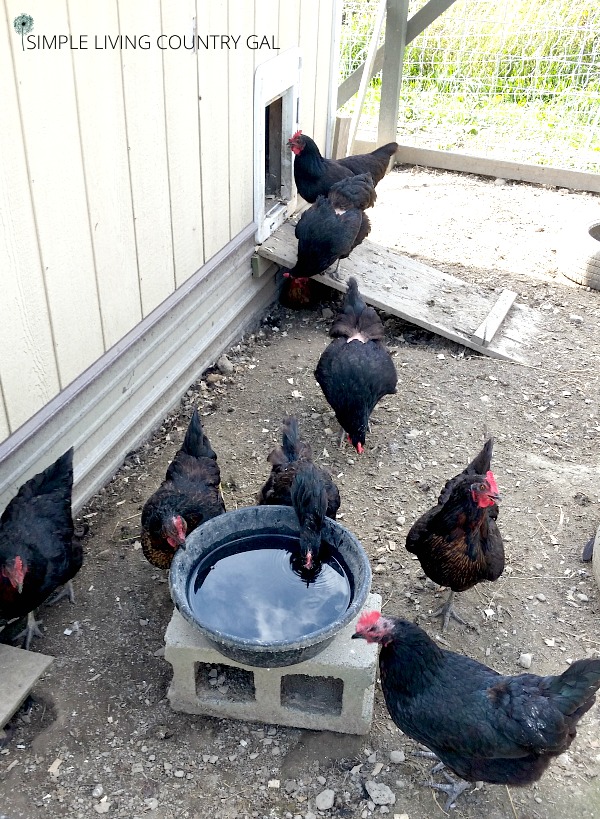
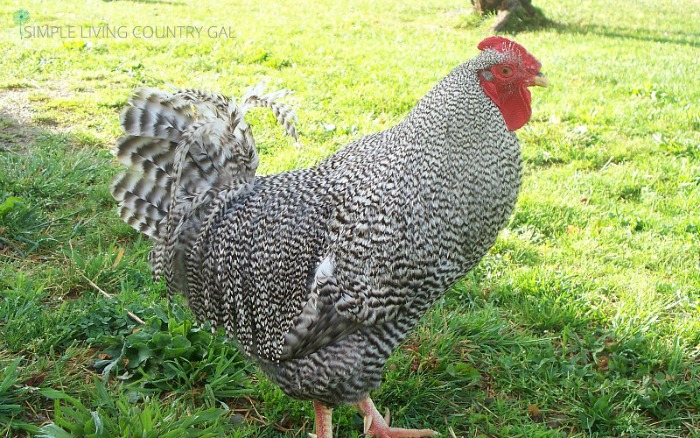
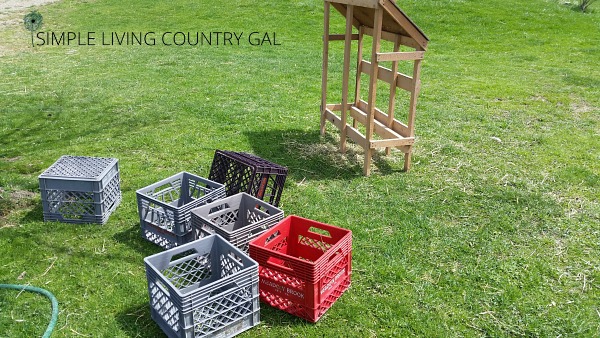
Hi, Tracy! Great to see you on the Blog Hop! :-). Thanks for writing about using ACV–We are getting ready to Winterize our place for the animals, and one of the things I’m doing is overhauling the poultry watering systems we have going. I’ll be adding ACV! Have an awesome day! Heidi
Hi there Heidi!
So glad my post article was helpful. I would love to see your new watering system! I am looking to do the same and need some inspiration.
Hope you have an awesome day too!
Tracy Lynn
Hi i have a flock of chickens that are more like pets they love it when you pick them up and pet them I will be trying ACV to keep them healthy bc sometimes they fly over our backyard fence:)
I just love that your hens allow you to pick them up and pet them! That makes it so much easier to catch them when you need to. Just remember when administering anything new to your animals to do it slowly. Not all things work for all animals and if your hens do not take well to the ACV, stop. Let them tell you what is best for them.
Tracy Lynn
Your website and the information is very helpful!! Especially to a novice of just acquiring 21 chicks, of which we just lost one, from something unknown to us, goi5to have to thoroughly clean and sanitize our brooder tomorrow and start clean and hope not to lose anymore chicks! Thank you for the info!
Can a plastic/rubber bowl go on a metal water heater? With out winters the water will be frozen within 3-4 hours.
Hello, Rita!
It all depends on how hot your water heater gets. I have to change my chicken’s water 3-4 times a day. I know it’s a lot but for me that gives me a chance to check on everyone to be sure no one is sick or off or has any issues.
You may need to “test” it out first to be sure you have no issues but again I am not sure how hot your’s gets so I am hesitant to give the go ahead.
Tracy Lynn
I had no idea this ACV for livestock was a thing until I read about it in a really great, old book called Arthritis and Folk Medicine (by D.C. Jarvis, MD) and it listed so many benefits for the birds drinking it- I was so excited.
Stumbling upon this article was fun and great help for starting this. I’m going to put my baby chicks on it slowly. Thank you for the information!
I am glad you found it helpful, please remember that with young chicks to be very careful when giving ACV. Less is more until they are a bit older.
Best wishes!
Tracy Lynn
WOW ! I am so glad I found this! We have 170 hens and 6 Roosters. We are battling stick tight fleas right now. they did get a raspatory thing last year and we treated it. I want to put them back on ACV. We use 7 gallon plastic waters. Not sure how much we should put in them and how often for the amount of birds we have. I love the idea to spray the coop to keep pests away.
thank you so much
Hello, Daphne!
Wow, that is a big flock! I used 1 tbs ACV to 1 gallon of water. I just premix it in cleaned-out milk jugs and fill the hen’s waterers that way. Remember to have a few of the waterers just plain water for any hens that do not like the taste.
Tracy Lynn
You might look into diatomaceous earth. It’s wonderful stuff for sprinkling around the coop and nest boxes to keep down the creepy crawly things that hens tend to pick up.
We are just starting out with a few chicks. I’d like to try ACV in water for them. Two questions for you. One, how much should I add? Just a few drops? And two, I was going to use a waterer, but you mentioned a tub. Which would be better to start with? Thanks!
Hello, Dawn!
You can mix 1 tbs of ACV to one gallon of water and use that for the chicks. Yes, you can use a chick waterer, you just need to make sure it is not metal. I like to use water tubs for my grown chickens but not my chicks.
I hope that helps!
Tracy Lynn
Can the ACV have honey, turmeric, or lemon?
I have not used anything other than organic simple ACV to feed my livestock. Anything additional you may want to do a bit of research first.
Tracy Lynn
Loved reading your article. it was really informational for me. wish to see more in the coming days.